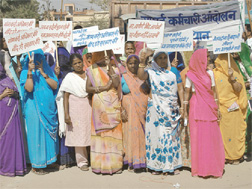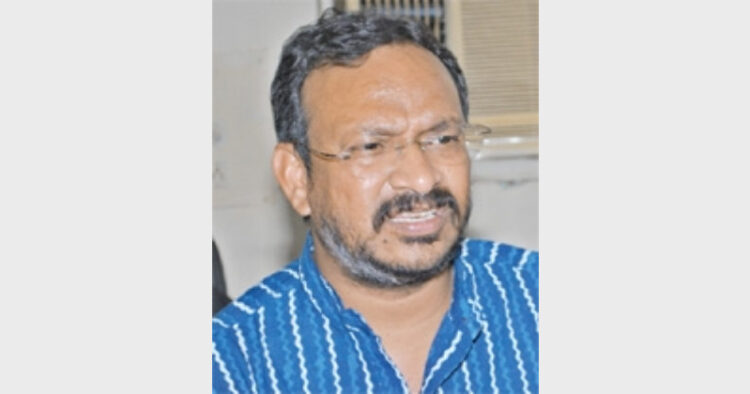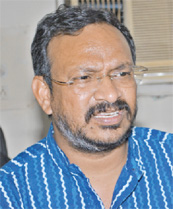Wilson Bezwada’s tirade against manual scavenging
Restoring dignity to life??
|
Wilson Bezwada?, Founder, Safai Karmachari Andolan? |
Intro: Despite clear laws from Centre to States abolishing manual scavenging, lakhs of people are still forced to clean night soil manually. The Union Ministry of Social Justice and Empowerment on July 22, 2005 accepted 6.76 lakh people working as manual scavengers, but the actual figures are estimated to be about 12 lakh. Astonishingly most of these people, about 95 per cent, are women. Not only the clean private dry latrines in some states, even the Indian Railways employ a large number of people for manually clearing the tracks of sewage and human waste. Since everything is being mechanised today, why no use of machines to eradicate this practice? Wilson Bezwada of Delhi has been fighting for a change in the mentality and practice for 35 years, writes
Innovations and technology have made the human life easier in many ways. Still new innovations surface every day making it faster, easier and comfortable. But all these innovations or advancements have no use for a prominent segment of our population, the manual scavengers, without whom the human life can come to a halt even in a single day. In 1995, the Planning Commission conducted a study and recorded about six lakh people engaged in this inhuman practice. The practice is not restricted to just private sector or a few states. The Indian Railways is a big employer using people for manually clearing the tracks of human waste.
During the last one centaury technology might have completely transformed the human life. But for the manual scavengers the only change is that earlier they carried human waste on head and now they carry it in buckets. According to an estimate, 2,51,963 dry latrines still exist in six states and they are cleaned manually—mostly with basic tools like tin boards. We have not even tried to understand the health risks connected to the nature of this job.
 The practice of mannual scavenging was banned in 1993 by the then Narasimha Rao Government by passing a bill in the Parliament. The law was later adopted by 23 states and all Union Territories. But the most tragic part of it is that during the last 21 years not a single conviction has been made under it. In 2013, it was amended and its definition was expanded by covering septic tank cleaners, railway track cleaners and open or underground drainage cleaners also. Some provisions for rehabilitation of these people were also made by providing them alternate employment like cooks for Anganwadis and mid-day meal schemes, railway staff assisting the elderly, the disabled or children, caretakers of public parks/gardens, plumbers or electrical repair workers. The Ministry of Railways was even suggested to set aside a quota to absorb ex-scavengers as railway catering staff.
The practice of mannual scavenging was banned in 1993 by the then Narasimha Rao Government by passing a bill in the Parliament. The law was later adopted by 23 states and all Union Territories. But the most tragic part of it is that during the last 21 years not a single conviction has been made under it. In 2013, it was amended and its definition was expanded by covering septic tank cleaners, railway track cleaners and open or underground drainage cleaners also. Some provisions for rehabilitation of these people were also made by providing them alternate employment like cooks for Anganwadis and mid-day meal schemes, railway staff assisting the elderly, the disabled or children, caretakers of public parks/gardens, plumbers or electrical repair workers. The Ministry of Railways was even suggested to set aside a quota to absorb ex-scavengers as railway catering staff.
|
“This whole fight is only to restore dignity to the life of manual scavengers. Why a particular caste, community or section of the society be deprived of respectful living? Why the task should not be mechanised,” asks Wilson Bezwada who has been fighting against this practice from roads to the courts for 35 years. He belongs to Madiga community of Karnataka, which has traditionally been working as manual scavengers. With a team of about 6,000 volunteers (most from within the community itself) and units of his Safai Karmachari Andolan in 18 states, he is fighting for this cause. Petitioning courts to fecilitating in rehabilitation, meeting officials, going into the field to talk to workers, holding meetings with other voluntary organisations, it’s all in a day’s work for Wilson. “This is my life, this work gives me satisfaction,” he says.
Famous as Anna among his followers, Wilson has been working for rehabilitation of these people. But instead of coming forward in good number many of them still ask “if we stop it, where will we get roti from?” Therefore, Wilson has double challenge—to change the mentality of not only the government officials, but also these people. “There are many people involved in this practice who want to keep their identity secret because it is shameful practice. My own brother was doing this work for so many years, but he intimated my sister-in-law only after eight years of their marriage,” he points out.
According to Wilson, manual scavenging is highest in Uttar Pradesh, followed by Madhya Pradesh, Bihar, J&K, Gujarat and Uttarakhand. In Southern states, the number of dry latrines may be less, but cleaning of septic tanks is there. Every town has septic tanks. To eradicate manual scavenging remodeling of town planning is also eminent. “There should be mechanised way of cleaning latrines, septic tanks, etc. Those who are now engaged in this practice should be repositioned in non-scavenging dignified occupations whether it is gardener, road making persons, etc. But the problem is that officials have the mentality of thinking about them around toilets only like suggesting to involve them in phenyl production, broom making, constructing toilets, etc.,” he added.
In the country where, for many, caste still dictates the profession and life, changing one’s ‘destiny’ is not that easy. “Hoping to find a job, I registered my name at employment exchange. They heard my caste and automatically registered my name for sweeping and scavenging jobs,” recalled Wilson. Therefore, the change in mindset is required at many levels. Even those, for whom Wilson is fighting, were not ready to join him. “It took about two decades for me to persuade these people. In the beginning they thought I am trying to snatch their jobs. But now not only they but other people too have understood us. We want the researchers, intellectuals and scientist should collectively find solution to this problem. After all when we have made so many advancements in different fields including the kitchen, then why can’t we think on similar advancements for cleaning the toilets also,” he says.
Not only the people involved in manual scavenging but also the issue itself seem to be untouchable as not many voluntary organisations have come forward to take up the task. Laws are already there, but the implementation has been so poor that the officials responsible for rehabilitating these people, take months, even years some times, to release the financial help for those who want to take up any other occupation. “Each government has offered various types of packages for it. But the officials have not been very keen to actually help. What is needed is accountability in the bureaucracy and willpower at the political level. If the head of the government takes interest, the practice can be eradicated within 60 days and India can be declared free from manual scavenging,” adds Wilson.
Sometime back the CAG after evaluating the ‘National Scheme for Liberation and Rehabilitation of Scavengers and their Dependents’ revealed that the Scheme “failed to achieve its objectives even after 10 years of implementation involving investment of more than Rs. 600 crores”. It further pointed out that although funds were available for implementation of the Scheme, much of it were unspent or underutilised. The Committees set up for monitoring the Scheme too were non-functional. What is needed is not just ‘liberation’ from this inhuman practice, but their proper rehabilitation by providing them training in livelihood skills. While disposing off a petition filed by Safai Karmachari Andolan and others, the Supreme Court bench of Justice P Sathasivam, Justice Ranjan Gogoi and justice NV Ramana on March 27, 2014 also said the similar thing. One can only hope that the SC’s directions are respected and implemented.
-Pramod Kumar??




 The Trendsetter?,
The Trendsetter?,









Comments